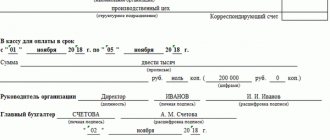Reflect the identified shortage of property with wiring:
Debit 73 Credit 10 (01, 41…50)
– loss of property (materials, goods, fixed assets, money, etc.) has been identified.
The amount of damage that the organization compensates to the party affected by the actions of its employee is reflected in the following posting:
Debit 73 Credit 76 (60)
– the debt to the injured party is reflected.
Write off the amount of damage in excess of the norms of natural loss at the expense of the guilty parties (subparagraph “b”, paragraph 28 of the Regulations on Accounting and Reporting).
For the amount of funds withheld from the employee’s earnings, make an entry:
Debit 70 Credit 73
– the cost of damage was deducted from the employee’s salary by order of the manager.
If an employee voluntarily or by court decision compensates for amounts in excess of earnings, reflect this as follows:
Debit 50 Credit 73
– the employee is compensated for the amount of damage.
For the amount that the employee does not reimburse the organization (the court found him not guilty, or he has limited financial liability), make an entry:
Debit 91-2 Credit 73
– the cost of damage is written off as other expenses.
The head of the organization may decide to collect the shortage at the market price. Reflect the difference between the market and book value of the shortage by posting:
Debit 73 Credit 98
– reflects the difference between the book value of the missing valuables and the amount to be recovered from the guilty party.
As the culprit repays the debt, the amount of the shortfall is included in other income:
Debit 98 Credit 91-1
– part of the income of future periods is taken into account as other income.
The head of the organization may decide not to fully or partially recover the shortfall from the guilty employee (Article 240 of the Labor Code of the Russian Federation). The reasons may be different: the employee’s previous merits, difficult financial situation, insignificant damage, etc. The amount of damage is included in other expenses:
Debit 91-2 Credit 73
– the residual value of missing valuables is reflected as part of other expenses.
If the organization refuses to recover the amount of damage from the employee, then personal income tax must be withheld from him, and insurance premiums must be charged for the cost of the damage.
Make the same entries if the organization paid an administrative fine for an employee (for example, for violating traffic rules) and subsequently decided not to collect this amount. Don’t forget to also withhold personal income tax and calculate insurance premiums.
Causing material damage by an employee of an organization
If a shortage or material damage is detected, the employer has the right to recover from the salary the amount of damage caused. Retention must be carried out within the legal framework:
- A special inspection must be organized to determine the amount of damage incurred;
- The inspection is carried out by a commission that draws up reports on the causes and amount of damage and determines the culprit;
- The employee responsible for causing damage is obliged to familiarize himself with the acts and document in writing the reasons why the damage was caused to the organization;
- The employee is responsible for compensation for damages.
In accordance with labor legislation, the employee bears full financial responsibility in the following situations:
- The shortage of cash or goods occurred during the performance of the duties of a specific employee.
- The employee is financially responsible for certain goods or funds within the framework of the employment contract signed with the organization.
Personal income tax
If an organization recovers damages from an employee, there is no need to withhold personal income tax, since in this case the employee does not generate income. This follows from Article 41 of the Tax Code of the Russian Federation.
Situation: is it necessary to withhold personal income tax if an organization refuses to recover material damage from an employee?
Answer: yes, it is necessary.
Personal income tax is assessed on employee income received in cash or in kind (Article 209, paragraph 1 of Article 211 of the Tax Code of the Russian Federation). Income in kind includes, in particular, payment by an organization for employees of goods, work, and services (subclause 1, clause 2, article 211 of the Tax Code of the Russian Federation).
The employee’s obligation to compensate the employer for direct material damage caused to him is prescribed in Article 238 of the Labor Code of the Russian Federation. Thus, if an employee’s guilt in causing material damage is proven and the amount of damage is determined, the employee has an obligation to the organization to compensate for this damage. However, the manager may completely or partially refuse to recover damages from the perpetrator (Article 240 of the Labor Code of the Russian Federation). In such a situation, it turns out that the organization compensated for the damage (to itself or third parties) instead of the employee. And accordingly, the latter receives income in kind. Withhold personal income tax from this income (Articles 210, 211 of the Tax Code of the Russian Federation).
Similar conclusions follow from letters of the Ministry of Finance of Russia dated April 10, 2013 No. 03-04-06/1183, dated November 8, 2012 No. 03-04-06/10-310.
In this case, personal income tax is calculated on the amount of direct damage, which includes:
– the cost of destroyed (damaged) property;
– costs of acquiring, restoring property (for example, repairs);
– costs of compensation for damage caused by an employee to third parties (for example, compensation for damage in a road accident).
At the same time, the Federal Tax Service of Russia believes that it is not necessary to withhold personal income tax from the amount of a fine paid for an employee for violating traffic rules.
Situation: is it necessary to withhold personal income tax if an organization paid an administrative fine for an employee (for example, for violating traffic rules on the organization’s car)?
Answer: yes, it is necessary. Although the explanations of regulatory agencies on this issue are ambiguous.
According to representatives of the financial department, the cost of paying an administrative fine is damage caused to the employer. Refusal to collect the fine from the guilty employee results in the latter receiving income in kind. Consequently, in such a situation, the organization must withhold personal income tax (letters of the Ministry of Finance of Russia dated June 17, 2014 No. 03-04-05/28925, dated April 12, 2013 No. 03-04-06/12341, dated April 10, 2013 No. 03-04-06/1183, dated November 8, 2012 No. 03-04-06/10-310).
However, according to the Federal Tax Service of Russia, in this case there is no need to withhold personal income tax. After all, if an organization does not collect the amount of a fine from an employee who committed a violation, he does not receive income in kind. This means that there are no grounds for calculating personal income tax.
Similar clarifications are contained in the letter of the Federal Tax Service of Russia dated April 18, 2013 No. ED-4-3/7135.
It is worth noting that the right to explain the legislation on taxes and fees is vested in the Russian Ministry of Finance (Clause 1, Article 34.2 of the Tax Code of the Russian Federation). At the same time, tax inspectorates are required to be guided by written explanations from financial department specialists on the application of legislation on taxes and fees (subclause 5, clause 1, article 32 of the Tax Code of the Russian Federation).
Thus, when deciding on the withholding of personal income tax in a case where the organization has not collected the amount of an administrative fine from the guilty employee, be guided by the position of the Russian Ministry of Finance. For example, in the case of paying an administrative fine for an employee who violated traffic rules in the organization’s car. It does not matter how the violation was recorded: by a photo/video recording camera or directly by a police officer.
Advice: there are factors that make it possible not to withhold personal income tax from an administrative fine that the organization did not collect from the guilty employee. They are as follows.
From letters of the Ministry of Finance of Russia dated April 12, 2013 No. 03-04-06/12341, dated April 10, 2013 No. 03-04-06/1183 it follows that in some cases personal income tax does not need to be withheld. This is possible if:
- the employee committed a violation under circumstances excluding financial liability (Article 239 of the Labor Code of the Russian Federation);
- the employer did not provide the employee with conditions for the safety of property;
- the employee acted in accordance with the employer’s order, regulation, or other mandatory documents. For example, a written instruction stating that the employee is obliged to get to the destination as soon as possible.
In such situations, the employee cannot be held financially liable. This means that when an organization pays a fine for an employee, it does not have the obligation to withhold personal income tax.
The procedure for calculating other taxes when compensating for damage caused by an employee depends on what taxation system the organization uses.
Accounting entries: deduction of shortfalls from wages
After carrying out all the necessary procedures, the accountant is obliged to deduct the relevant accounts and withdraw the required amount from the employee’s salary.
| Debit | Credit | Description |
| 73 | 10 (01, 41,…) | A shortage of material assets (OS, money, goods, etc.) has been detected. |
| 70 | 73 | Withholding the shortfall from the employee's salary |
| 50 | 73 | Voluntary compensation for damage by an employee |
| 91.2 | 73 | Write-off for other expenses in case of incomplete compensation of the deficiency by the employee |
| 73 | 98 | Reflection of the amount intended for reimbursement |
| 98 | 91.1 | As the employee makes up for the shortfall, the amount is included in other income |
Accounting for settlements with personnel for other transactions on account 73
The debt for shortages of valuables identified in previous years was written off in full or in part to the financial result of the organization as the profit of previous years identified in the reporting year. Accounting entries when compensating for shortages of past periods by the guilty parties by transfer of property (with the consent of the employer) 1 07, 08, 10, 41, 15 73-2 The amount of compensation for shortfalls from previous periods by the organization’s employees (culprits) has been repaid in full or in part, and at the same time 2 98-3 91-1 The debt for shortfalls of valuables identified in previous years on the financial result of the organization has been written off in full or in part. as the profit of previous years, identified in the reporting year. Reflection in accounting of debt compensation for the difference between the amount to be recovered from the guilty parties and the book value for shortages of valuables.
Amount of salary deduction
Salary deductions can be classified as:
- Mandatory: personal income tax, withholding according to executive documents.
- Retention at the initiative of the employer.
According to labor laws, the maximum possible amount of deduction from wages is 20% of the salary, unless otherwise provided. Only if there is a justified reason can the employer count on a larger amount not exceeding the average monthly salary. Although in some cases a court decision may order compensation of an amount several times greater than the employee’s salary, this is the exception rather than the rule and depends on each specific case within the framework of existing legislation.
| Maximum amount (in %), part of salary | Rationale |
| 20 | Personal income tax, executive documents |
| 50 | Cases provided for by the Federal Law of the Russian Federation |
| 70 | Alimony, personal injury, crime |
| 100 | Shortages, damage if there is a legal basis |
| More | The court's decision |
By agreement with the employer, the employee has the right to compensate for damage by transferring equivalent material assets.
Is there always an investigation?
As stated above, when establishing the fact of theft, it is necessary to take an inventory. After this, the investigative authorities must initiate a criminal case and conduct an investigation into this fact. But, as practice shows, criminal cases are not always initiated. Thus, investigative authorities issue decisions to refuse to initiate cases if the amount of the shortage was formed from undocumented thefts committed by an indefinite number of persons (for example, buyers in trading floors) at an unspecified time and there is no objective possibility of searching for this data.
As noted by the Supreme Arbitration Court of the Russian Federation in Decision No. VAS-13048/13 dated December 4, 2013, police officers did not see any grounds for initiating criminal cases, since there was no specific information and data indicating the commission of a crime (the time, extent of theft, number of facts were not established , it is impossible to distinguish shortages from each other regarding their theft by one person or several). The requirement to initiate a criminal case, during the investigation of which the perpetrators cannot be identified, is excessive, and the condition for the existence of a resolution to terminate the preliminary investigation is impossible.
Deduction from wages of shortages during inventory
Carrying out an inventory is the most effective way to identify what was lost, broken or stolen and identify those responsible who will bear financial responsibility for the damage caused. But before making accusations, it is necessary to find out whether the shortage is a natural rate of loss, which is determined by law. If, nevertheless, a clear violation and deficiency is identified and documented by the relevant acts, then it is worth determining the real amount of damage that the employee is obliged to compensate.
Very often, damage or shortages entail associated costs for the restoration of equipment, the purchase and delivery of new materials, repairs, installations, etc. This means that in fact the amount of damage increases by related expenses and can also be deducted from the employee’s salary or returned to them through the cash register.
Shortage at the cash register, deduction from the cashier's salary
Finding an insufficient amount of money in the cash register is also a damage. If such a precedent occurs, it is necessary to conduct an audit of the cash register. The procedure for conducting an audit must be fixed by internal legal documents. As when conducting an inventory (an audit is one of the forms of inventory), it is necessary to make sure that the amount of the shortage exceeds the natural rate of loss determined by law.
Having carried out the necessary procedure to record the fact of the shortage and familiarize the perpetrators with the documents on the audit, the organization has every right to recover the amount of the shortage from the salary, if it does not exceed the average monthly salary. The collection procedure is endorsed by the General Director in a special order, which must be issued within a month after all acts are drawn up, otherwise the shortage may be withheld by order of the executive authority.
Deduction from wages upon dismissal of an employee
There are situations when a shortage is identified, all documents are completed, and the employee expresses a desire to resign from the organization. In this situation, the employer has the right:
- Offer the employee to stay until his debt to the organization is fully worked off, but these are rather not legal measures, but rather personal ones between the employee and the employer;
- The employer has the right to withhold the amount of damage not exceeding wages or, with the voluntary consent of the subordinate, to withhold the entire amount of damage from the payments due upon dismissal;
- Collect damages through executive authorities.
The dismissal of an employee cannot be a reason for evading compensation for damage to the organization if the entire procedure took place within the legal framework established by Russian legislation.
An example of calculating deduction from an employee's salary
An employee of a car rental company received a fine for improperly parking a company car while using it after hours. The fine was issued to the organization and amounted to 5,000.00 rubles. The average monthly salary of an employee is 27,000.00 rubles. Based on the fact of the damage incurred, the company drew up relevant acts, which the culprit was familiarized with.
Calculation:
- At the beginning of the month, the employee was given an advance in the amount of 10,000.00 rubles (personal income tax is not charged), 20% can be withheld from this amount: 10,000.00 * 0.2 = 2,000.00 rubles
- For the entire month, wages were accrued in the amount of 27,000.00 rubles, personal income tax is 3,510.00 rubles, we will calculate the amount of compensation.
- (27,000.00 – 3,510.00 – 10,000.00)*0.2 = 2,698.00 rubles
- Balance amount 5,000.00 – 2,000.00 – 2,698.00 =302, rubles
Common mistakes when deducting from wages
- Violation of the established procedure provided for by labor legislation, in terms of established deadlines and drawing up relevant acts. If this happens, the employee will have the right to go to court to appeal the employer’s actions;
- Withholding too large amounts that are not provided for by labor legislation;
- Deduction from wages for a reason not related to legal violations established by the labor code. In some organizations, employers apply an internal system of fines for using social networks during working hours, smoking, appearance, etc.
All these errors and violations can become a reason for bringing the employer to administrative liability; in addition to the obligation to return the withheld money and pay compensation for moral damage, you will have to pay a fine for delayed payment of wages.
Insurance premiums
If an organization recovers damages from an employee, there is no need to pay insurance premiums. Indeed, in this case, there is no object for taxation of contributions (Article 7 of the Law of July 24, 2009 No. 212-FZ, Article 20.1 of the Law of July 24, 1998 No. 125-FZ).
Situation: is it necessary to charge insurance premiums if an organization paid an administrative fine for an employee (for example, for violating traffic rules on the organization’s car)?
Answer: yes, it is necessary.
As a general rule, an administrative fine must be paid by the one who was brought to justice (Part 1 of Article 32.2 of the Code of Administrative Offenses of the Russian Federation). That is, in this case it is the employee himself.
If the organization paid the fine for it, then in this case the employee receives income. At the same time, the list of amounts exempt from contributions does not provide for the payment of an administrative fine for an employee. This means that contributions must be calculated in the general manner (Articles 7 and 9 of the Law of July 24, 2009 No. 212-FZ, Articles 20.1 and 20.2 of the Law of July 24, 1998 No. 125-FZ).
These rules also apply when paying an administrative fine for an employee who violated traffic rules in an organization’s car. It does not matter how the violation was recorded: by a photo/video recording camera or directly by a police officer.






